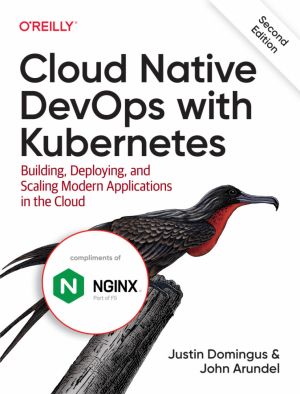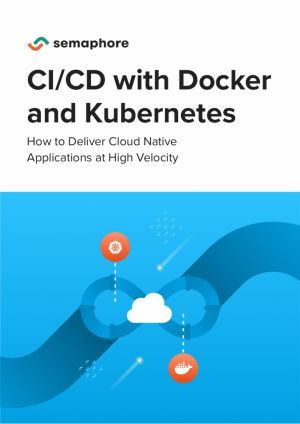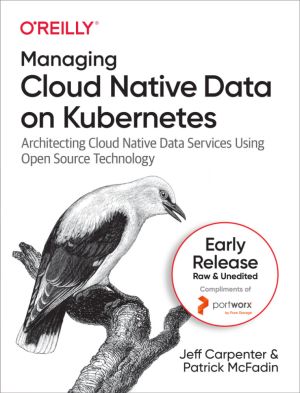Managing Cloud Native Data on Kubernetes
Architecting Cloud Native Data Services Using Open Source Technology
by Jeff Carpenter, Patrick McFadin
DescriptionTable of ContentsDetailsHashtagsReport an issue
Using Kubernetes as your platform, you'll learn open source technologies that are designed and built for the cloud. Authors Jeff Carpenter and Patrick McFadin provide case studies to help you explore new use cases and avoid the pitfalls others have faced. You'll get an insider's view of what's coming from innovators who are creating next-generation architectures and infrastructure.
- Learn how to use basic Kubernetes resources to compose data infrastructure
- Automate the deployment and operations of data infrastructure on Kubernetes using tools like Helm and operators
- Evaluate and select data infrastructure technologies for use in your applications
- Integrate data infrastructure technologies into your overall stack
- Explore emerging technologies that will enhance your Kubernetes-based applications in the future 





Book Description
Is Kubernetes ready for stateful workloads? This open source system has become the primary platform for deploying and managing cloud native applications. But because it was originally designed for stateless workloads, working with data on Kubernetes has been challenging. If you want to avoid the inefficiencies and duplicative costs of having separate infrastructure for applications and data, this practical guide can help.Using Kubernetes as your platform, you'll learn open source technologies that are designed and built for the cloud. Authors Jeff Carpenter and Patrick McFadin provide case studies to help you explore new use cases and avoid the pitfalls others have faced. You'll get an insider's view of what's coming from innovators who are creating next-generation architectures and infrastructure.
- Learn how to use basic Kubernetes resources to compose data infrastructure
- Automate the deployment and operations of data infrastructure on Kubernetes using tools like Helm and operators
- Evaluate and select data infrastructure technologies for use in your applications
- Integrate data infrastructure technologies into your overall stack
- Explore emerging technologies that will enhance your Kubernetes-based applications in the future
This open access book is Complimented by PortWorx. You can download Managing Cloud Native Data on Kubernetes ebook for free in PDF format (8.0 MB).
Table of Contents
Chapter 1
Introduction to Cloud Native Data Infrastructure: Persistence, Streaming, and Batch Analytics
Chapter 2
Managing Data Storage on Kubernetes
Chapter 3
Databases on Kubernetes the Hard Way
Chapter 4
Automating Database Deployment on Kubernetes with Helm
Chapter 5
Automating Database Management on Kubernetes with Operators
Chapter 6
Integrating Data Infrastructure in a Kubernetes Stack
Chapter 7
The Kubernetes Native Database
Chapter 8
Streaming Data on Kubernetes
Chapter 9
Data Analytics on Kubernetes
Chapter 10
Machine Learning and Other Emerging Use Cases
Chapter 11
Migrating Data Workloads to Kubernetes
Book Details
Title
Managing Cloud Native Data on Kubernetes
Subject
Computer Science
Publisher
O'Reilly Media
Published
2023
Pages
278
Edition
1
Language
English
ISBN13
9781098111397
ISBN10
1098111397
ISBN13 Digital
9781098111380
ISBN10 Digital
1098111389
PDF Size
8.0 MB
License
Compliments of PortWorx
Related Books

The way developers design, build, and run software has changed significantly with the evolution of microservices and containers. These modern architectures use new primitives that require a different set of practices than most developers, tech leads, and architects are accustomed to. With this focused guide, Bilgin Ibryam and Roland Huß from Red H...

Kubernetes has become the operating system of today's cloud native world, providing a reliable and scalable platform for running containerized workloads. In this friendly, pragmatic book, cloud experts Justin Domingus and John Arundel show you what Kubernetes can do-and what you can do with it.
This updated second edition guides you through...

Adoption of cloud-native application architectures is helping many organizations transform their IT into a force for true agility in the marketplace. This report defines the unique characteristics of cloud-native application architectures such as microservices and twelve-factor applications.
Author Matt Stine also examines the cultural, organiza...

Containers change how developers build, test, and deploy code. Adopting them takes time. Using them the wrong way can slow down your delivery process.
But you don't have a team of engineers to dedicate to this like Spotify or Netflix do. Maybe you're a startup CTO with features to ship - you can't spend hundreds of hours on intern...

Cloud computing is a game changer. Being able to automate and constantly adjust infrastructure is one important reason to use cloud computing for your clients. And developing and operating systems that are able to recover from failure automatically has never been easier. Cloud providers offer you the needed infrastructure for a very reasonable pric...

Over the past two years, Simple-Talk has published articles on a variety of SysAdmin topics, from Exchange to Virtualization, and including everything from Powershell to Unified Messaging. We have brought the best of these articles together to form The SysAdmin Handbook. With over fifty articles packed into this book, it will be an essential refere...

